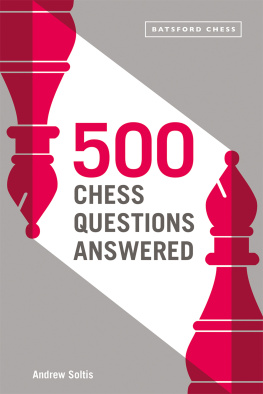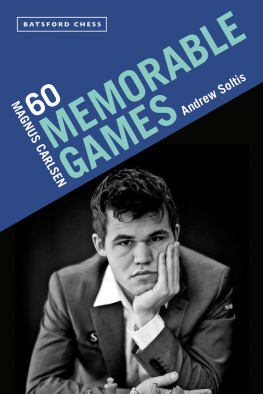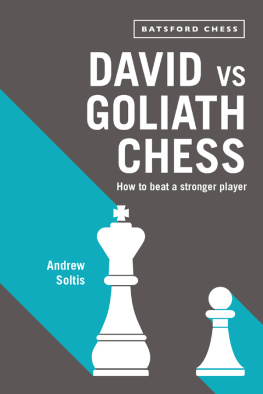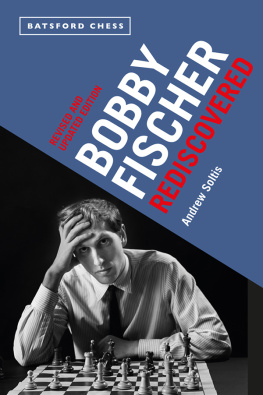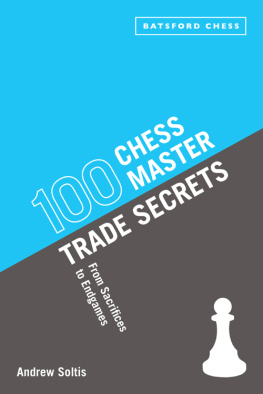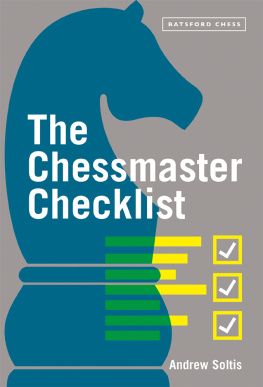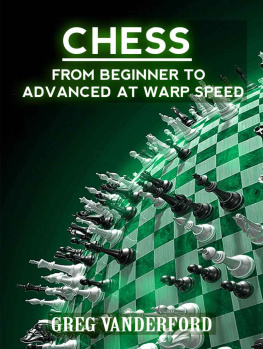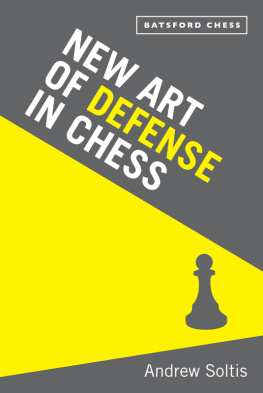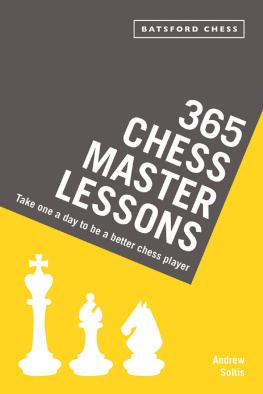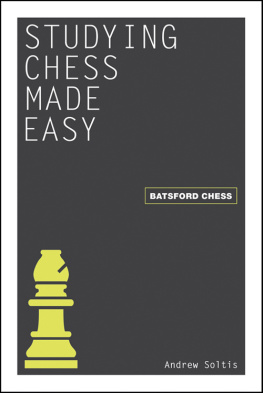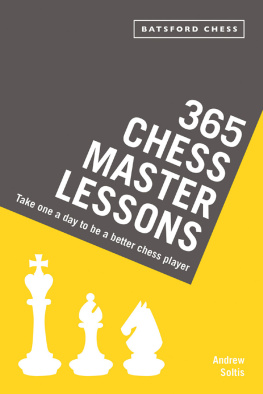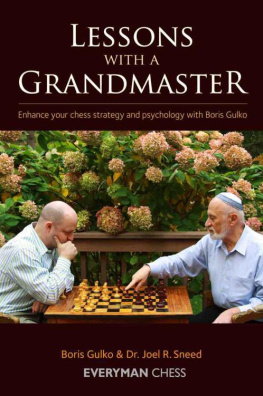Andrew Soltis - 500 Chess Questions Answered for all new chess players.
Here you can read online Andrew Soltis - 500 Chess Questions Answered for all new chess players. full text of the book (entire story) in english for free. Download pdf and epub, get meaning, cover and reviews about this ebook. year: 2021, publisher: Batsford, genre: Children. Description of the work, (preface) as well as reviews are available. Best literature library LitArk.com created for fans of good reading and offers a wide selection of genres:
Romance novel
Science fiction
Adventure
Detective
Science
History
Home and family
Prose
Art
Politics
Computer
Non-fiction
Religion
Business
Children
Humor
Choose a favorite category and find really read worthwhile books. Enjoy immersion in the world of imagination, feel the emotions of the characters or learn something new for yourself, make an fascinating discovery.
- Book:500 Chess Questions Answered for all new chess players.
- Author:
- Publisher:Batsford
- Genre:
- Year:2021
- Rating:4 / 5
- Favourites:Add to favourites
- Your mark:
- 80
- 1
- 2
- 3
- 4
- 5
500 Chess Questions Answered for all new chess players.: summary, description and annotation
We offer to read an annotation, description, summary or preface (depends on what the author of the book "500 Chess Questions Answered for all new chess players." wrote himself). If you haven't found the necessary information about the book — write in the comments, we will try to find it.
500 Chess Questions Answered for all new chess players. — read online for free the complete book (whole text) full work
Below is the text of the book, divided by pages. System saving the place of the last page read, allows you to conveniently read the book "500 Chess Questions Answered for all new chess players." online for free, without having to search again every time where you left off. Put a bookmark, and you can go to the page where you finished reading at any time.
Font size:
Interval:
Bookmark:

Andrew Soltis
This is a book for people who are discovering how hard it is to get better at chess. They are learning more. But they are also learning there is much more to learn.
They have scanned Web sites and blogs, browsed books and watched videos. But for every question these resources answer, they have more questions that go unanswered.
Ive tried to answer the most often asked questions. Here is some advice before you start.
Dont try to swallow too much in one sitting. A dozen questions may be a lot to absorb. Chess ideas take a while to sink in.
But feel free to open this book on any page when you have a spare moment. Improving is incremental. Allow yourself to take the increments.
For many of the questions and answers, you wont need a board and pieces or a computer. Even for the questions that have diagrams and move analysis, you may benefit by reading the text first and coming back to the page later when you have time to think about it again and you can see more clearly what the moves mean.
Finally, Id like to thank my wife, Marcy, and others who helped with this book, including Andras, Debra, Kevin and Lubosh.
Andrew Soltis
New York 2021
No and there is some doubt natural chess talent exists.
There have been many attempts to detect it. But the results are inconclusive. Perhaps the most famous aptitude tests were created by a Czech scientist, Pavel Cerny, to study his countrys young players.
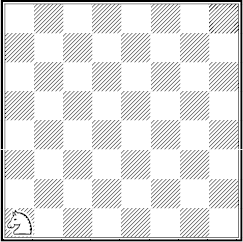
Knight tour to b1
In this first version, he asked subjects to figure out how to get the knight to b1 in the fewest moves. Simple enough.
Once they did that, he asked them to get it from b1 to c1. The test continued as the subjects had to reach d1, then e1 and so on to h1.
Once the first rank was done, the knight had to reach a2, then b2, c2 and all the second-rank squares. This was followed by the third-rank squares, and so on until the knight had gotten to h8. The subjects were asked to do it as quickly as they could.
Cerny devised a second, more challenging version of his test. He added four Black pawns.
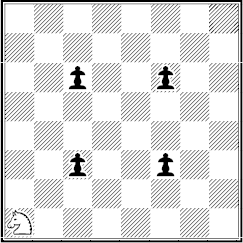
Knight tour to h8
The knight had to perform the same task but without capturing a pawn or landing on a square that allowed a pawn to capture it.
Most experienced players can solve the second version in less than ten minutes.
Not that alone. That is controversial.
One of the subjects, Lubos Kavalek, performed the second task in less than four minutes. He later became a grandmaster. But he called Cernys project a stupid test.
What seems clearer is this: If you take the tests a second time and perform the tasks faster than the first time, you have the talent to learn chess.
This confirms a long-held belief of chess teachers: The best gauge of ability is how well you can absorb what you study and then apply it.
Lothar Schmid, a grandmaster and world correspondence chess champion, said:
You can tell if you have talent if you understand what a weak square is, what development really means. If a young player can grasp these things quickly then he has talent.
A Hungarian psychologist did not believe natural talent existed and realized there was one way to prove it: By turning his children into prodigies.
After studying the biographies of hundreds of great thinkers, he concluded they were not born geniuses. Rather, they had intensely studied a specialized subject when they were young.
The psychologist, Lszl Polgar, tried to do this with his three young daughters. They became the most famous female prodigies in chess history.
And, by the way, the term chess prodigy is obsolete.
It made sense when Bobby Fischer became a grandmaster at 15 because he was so unique. But since Fischer did that, more than three generations ago, there have been more than 40 youngsters who earned the grandmaster title at an earlier age. The rarity of a chess prodigy has disappeared.
There are very good players who have normal IQs. And there are very bright people who are terrible at chess. Bill Gates was mated by Magnus Carlsen in 12 seconds.
Gates Carlsen
London 2014
1 e4 c6 2 f3 d5 3 d3 f6 4 exd5 xd5 5 c3 h5 6 0-0 g4 7 h3? e5?! 8 hxg4 fxg4

White to move
The world chess champion is bluffing a billionaire, with a threat of 9xf3+ and 10h2.
Gates would have been winning after 9 e1!.
But the game ended with 9 xe5?? h2 mate.
Some great players showed flashes of brilliance long before they mastered chess. Mikhail Tal, a future world champion, could multiply three-figure digits when he was 5. But many other masters showed no particular gifts when growing up.
Masters often say it takes the ability to concentrate, the capacity to work and strong willpower.
Once you begin to compete in tournaments, two other qualities self-confidence and honesty are valuable.
But there is one attribute you need to get started.
Curiosity.
An extreme example was featured early in the TV series The Queens Gambit. Some viewers questioned how Beth Harmon, the main character, could be so obsessed with chess that she could not sleep. She visualized pieces on the ceiling of her bedroom instead.
Lszl Polgar, that Hungarian psychologist, recalled how one night he found his daughter Sophia in the family bathroom, with the light on and a chessboard in her lap. She was fascinated by a position and her curiosity would not let go.
Sophia, leave the pieces alone, he said.
Daddy, they wont leave me alone! she replied.
You dont need insomnia-inducing curiosity to play well. But you need to be curious to keep learning.
You need self-confidence to overcome doubts when you choose a move. You need to be honest with yourself to recognize your chess weaknesses when you make bad moves. Then you can correct them.
Yes, and it is very important if you hope to become world champion. But if you just want to become a good player, memory is not very important.
You will need to memorize several opening moves, some common middlegame patterns and a few basic endgame positions.
Font size:
Interval:
Bookmark:
Similar books «500 Chess Questions Answered for all new chess players.»
Look at similar books to 500 Chess Questions Answered for all new chess players.. We have selected literature similar in name and meaning in the hope of providing readers with more options to find new, interesting, not yet read works.
Discussion, reviews of the book 500 Chess Questions Answered for all new chess players. and just readers' own opinions. Leave your comments, write what you think about the work, its meaning or the main characters. Specify what exactly you liked and what you didn't like, and why you think so.

